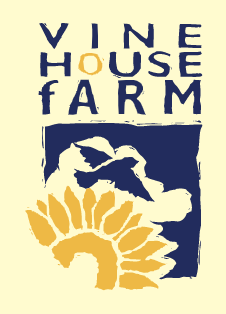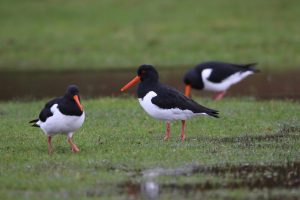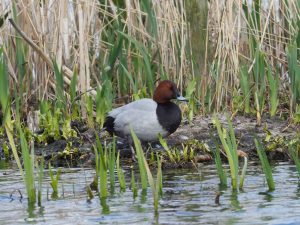
It has been a nice February, plenty of sunshine so above average temperatures, the 3rd warmest February in the last 50 years. There were no strong winds and below average rainfall, only 8mm, which makes it the 3rd driest I have ever recorded – a February to remember here in the Lincolnshire Fens.

The present spell of fine weather has been very welcome to most farmers, as we have been able to get some early drilling done and nitrogen applied. It could be a rather worrying time though for our water companies, who’ve not yet filled all their reservoirs.
The frosts that we have had since Christmas have broken the soil down into crumbs, so we’ve been able to make a wonderful seedbed. We have all the spring beans drilled and most of the spring barley. Spring beans make a good rotation crop and put nitrogen into the soil, which then helps the following crop. They’re also a good crop for wildlife as they flower and insects visit these flowers. The more flowers we have, the more insects we have, and that is why oil seed rape, that yellow crop you can see in April and May, is the best crop for birds. Insects are the food that our farmland birds need to feed their nestlings. Oil seed rape also produces a seed nearly as nutritious as sunflower seeds. It is not so popular with most birds because it is such a small seed, and has a husk that our finches have to remove to get to the centre. They also have to shell each sunflower seed but this is easier because it is a larger seed and so spend far less time feeding on sunflower seeds.
Linnets actually prefer rape seeds to sunflower seeds, I should think they spend the whole summer feeding on them. However, we have not been growing much rape over the last four years. It is a crop vulnerable to the flea beetle, which can only be stopped by coating the seed with a chemical. The chemical was a neonicotinoid which was withdrawn about five years ago as it affected honey bees and probably other insects as well but bees have been the main focus as they have actually a monetary value to them.
I have been mourning the decline of Linnets on the farm this last year and it has only occurred to me when writing this newsletter that the Linnets decline could be because the acreage of rape has declined. Reed Buntings have also declined and they like to nest in rape crops, so again that could be the reason for their decline.
All the sugar beet was lifted by the end of January and taken into the factory a few days later. We have no problem with the local Greylag Geese if they want to come and feed on the bits the sugar beet harvester missed. However, the sugar content of the sugar beet has been very poor this year. The value of the crop is the amount of sugar in the roots, so it could be down to the frosts before Christmas, killing off most of the green leaves. When more leaves have to grow this uses the sugar content.


Farmers have always been trying to reduce the numbers of weeds in their crops. Now with chemicals, they are able to farm without any weeds in their crops – if they apply the chemicals at the correct time. Any weed growing in the crop is competing for space, light and nutrients and will slightly reduce the yield of the crop. If there is an infestation of weeds, it can reduce the yield of the crop by more than 50%, so, naturally, we do not want weeds in our crops.
Now that we are farming without the weeds and producing so much more food, we are in the wrong because the wildlife has crashed, but is it the farmers who have done it? We do not make the chemicals, we are just told to use them. The scientists who make the chemicals should have known of the consequences, but no, farmers are to blame for the loss of wildlife.
It is probably 40 years now that we have been able to grow crops without any weeds on a regular basis. The weeds keep germinating until there are very few left in the soil. The finches that live on the seeds from weeds and feed unripe ones to their young are having just as tough a time as the rest of the birds that feed insects to their young.
Over the years people have often said ‘I would love to be able to identify bird songs’. Well, this is the time of year to start, when only a few birds are singing. If you go out in May, when our summer visitors have arrived, very often so many birds are singing that one song merges into another and you also can’t see the birds because of the leaves on the trees.
In early March, when not many birds are singing, don’t call it a “silent Spring” as it’s not really Spring in early March. You’ll probably be able to hear just one bird singing and will be able to identify it because the leaves are not yet on the trees. Go out several times with your binoculars, listen to the birds, and learn the songs of our common birds, before they all start to sing.
We have had a Mistle thrush and a Song Thrush singing, and now a Blackbird has started singing, a lot earlier than usual. I have seldom heard them in February before. It is nice to hear them as Spring must be on the way and the singing starts around 6am, an hour before sunrise. We have several Blackbirds in the garden, I rate them as good value birds as you never know what they are going to do next!
By the middle of March, things go all quiet and I used to think that maybe the females were sitting on eggs but that is not the case. Half of the Blackbirds in the garden will be from Scandinavia or other places where there is snow cover during the winter. Being ground feeders they have to spend the winter where they can find food on the ground. So, like many species, they make the 400 mile journey across the North Sea. Birds do rely on the winds of course, but never know where they are going to land on our coast. Many species are able to re-orientate themselves and find the same area to overwinter as the previous year – isn’t nature marvellous!
Join us for An Evening with Nicholas Watts
at Vine House Farm Shop & Café
Wednesday 22nd & 29th March, 6pm – 8.30pm
Farming & Wildlife Presentation
followed by a Q&A session
Tickets £12 include a glass of wine/elderflower cordial & canapés
To book tickets, please call 01775 630244 or order here: An Evening with Nicholas



